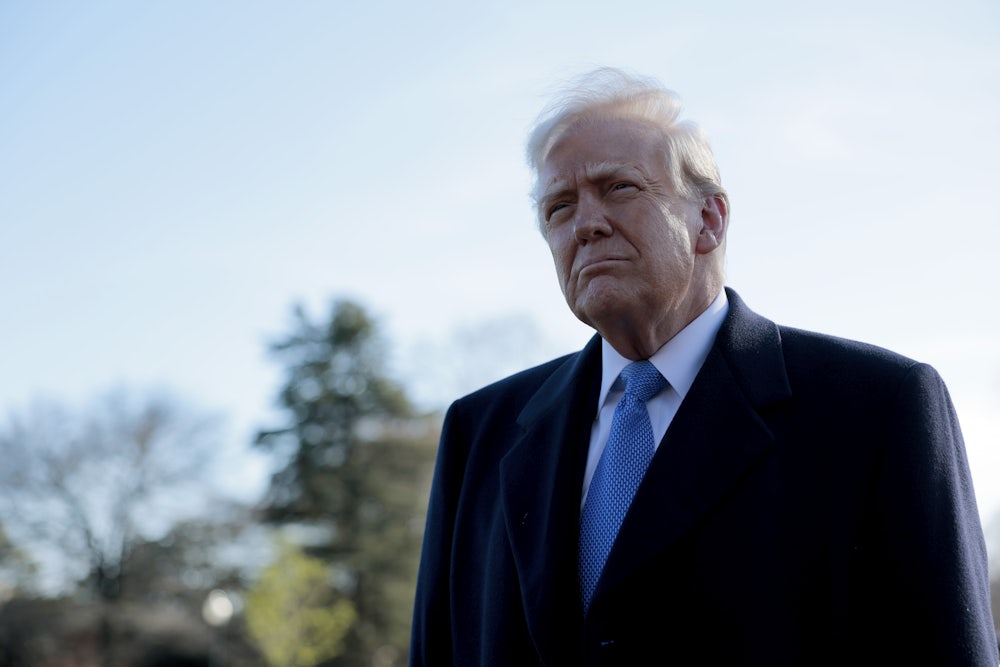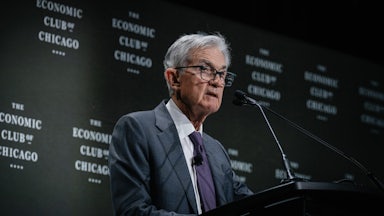Remember how April 2 was “Liberation Day”? That was the day Donald Trump announced his tariff regime; it was, I think, the third grand announcement out of about six total. I know you remember it—the shock to the markets created headlines that are hard to forget.
What you may not remember is that it was also Trump’s second Liberation Day. The first, I was reminded recently as I reread his inaugural address while reflecting on the administration’s 100-day mark that arrives this week, was Inauguration Day itself: “That is why each day under our administration of American patriots, we will be working to meet every crisis with dignity and power and strength. We will move with purpose and speed to bring back hope, prosperity, safety, and peace for citizens of every race, religion, color, and creed. For American citizens, January 20th, 2025, is Liberation Day.”
How’s that working out?
There is much to say about these 100 days. The odor of fascism is unmistakable—and entirely intentional. The bullying of universities and law firms; the probably illegal firings of those 18 inspectors general (you’d forgotten that one, I bet!); the ghastly executive order instructing the Justice Department to investigate two U.S. citizens for expressing their political views; the purposeful lawlessness of so many actions, designed to force showdown after showdown at what Trump assumes will be a pliant Supreme Court; the daily inversion of reality peddled by Karoline Leavitt, Cabinet officials, and not least Trump himself.
And more: the brazenly indefensible treatment of Mahmoud Khalil, a legal resident and green card holder, arrested without a warrant and held in a Louisiana detention facility where he missed the recent birth of his son, apparently just for engaging in political activism that Trump didn’t like. The clearly illegal deportation of Kilmar Abrego Garcia. The list goes on and on, and now, as of last week, includes a 2-year-old U.S. citizen who was deported and another child-citizen with metastatic cancer who was deported without access to medication.
But hey, let’s not focus on the extreme cases. Let’s just think about your average Americans.
It’s not working out so great for them, either. Here’s another key line from the inaugural address: “I will direct all members of my Cabinet to marshal the vast powers at their disposal to defeat what was record inflation and rapidly bring down costs and prices.”
Gee! That … doesn’t seem to have happened. Inflation is down a bit from last year, at 2.4 percent right now, largely because energy prices have fallen. Which, by the way, isn’t a Trump accomplishment: Energy price decreases are a function of overproduction, the explosion in electric vehicle production in China, and fears of recession (OK, he does get credit for that!). Meanwhile, the worry that Trump’s tariffs will spark new inflation is widespread: Fully 71 percent in a recent poll said they believe the tariffs will spike inflation. Even 47 percent of Republicans agreed. And this is the kind of topic on which public perceptions drive behavior and help create reality.
A New York Times reporter noted last week that the paper had heard from “hundreds” of businesses across the country “who said they have been stunned into paralysis by Trump’s barrage of tariffs.” An airplane parts manufacturer in Alaska was shocked at how “quickly and chaotically,” in the Times’ words, the tariffs have been applied. The company has no choice but to import some parts because they’re made only overseas. It has raised prices 17 percent, the owner has moved to Brazil where the living is cheaper, and he’s consulting a bankruptcy lawyer.
Liberation Day.
When we think of the word fascism, everyone’s mind races immediately to Adolf Hitler. But the world has seen many variants of fascism, Nazism being only one. There’s Italian fascismo, there’s Francoism, there’s Banderism (that was Ukrainian) and Ilminism (South Korean) and more. There’s neofascism and crypto-fascism and ur-fascism and Islamofascism. But Donald Trump has given us something new: clown-show fascism.
Clown-show fascism describes a regime marked simultaneously by hubristic and defiant assaults on the democratic and constitutional order on the one hand and, on the other, a nearly laughable incompetence in just about every other area of the regime’s activity. The first characteristic certainly applies to the Trump administration, and it’s chilling and frightening and not at all funny. Just ask Mahmoud Khalil.
Yet at the same time, in other areas, the incompetence has been staggering. Trump’s constant about-faces and walk backs on tariffs have been an international embarrassment. Elon Musk’s DOGE has fired federal workers willy-nilly only to turn around and rehire many after the Musketeers realized they weren’t deep-state bloodsuckers and the work they did was kind of essential, after all—you know, like the people who tend the country’s nuclear weapons stockpile.
It can be hilarious to watch. But it carries two consequences that are no laughing matter.
First and more obviously, we have the prospect of the impact of Trump’s tariffs policy on real people. Will they cause inflation and a recession, as most experts now believe? As fate would have it, Trump will go to bed the night of his 100th day in office—Tuesday—and wake up the very next morning to the release of the first-quarter GDP number. Economists expect anemic results. The Atlanta Fed even predicts negative growth, around -2.5 percent. During Trump’s first week in office, its forecast nudged a gaudy 4 percent, but the president’s actions have liberated that figure ever downward.
Second and more insidiously: Even the gross incompetencies take us into treacherous territory because they contribute to making this all about one man, the man who must be in front of the cameras every day. He doesn’t have policies so much as he has urges, which he must announce to the world on a constant basis in a desperate plea that we keep him front of mind at all times. Some of those urges are cruel; some of them are a joke. What unites them is that they make the story entirely about him.
That is not how it’s supposed to work in democracies. Which we still are, for now, as we reach this 100-day mark. Only 1,361 to go.










